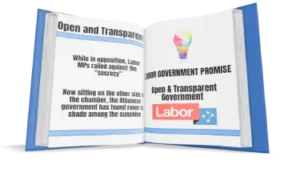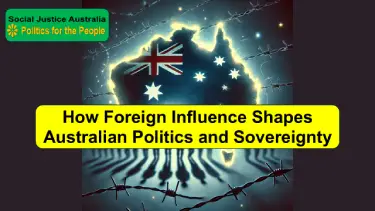Description:
Explore how foreign influence shapes Australian politics, and the path to political sovereignty, peace, and neutrality.
How Foreign Influence Shapes Australian Politics and Sovereignty
Foreign influence in Australian politics has become a pressing concern, shaping policies that often sideline the interests of Australians. The impacts of foreign agents, particularly those standing for powerful nations, are increasingly visible in policy areas from defence and economic strategies to resource management.
A historical turning point was Gough Whitlam’s leadership, as his dismissal underscored the potential extent of foreign interference. Today, the need to reclaim Australia’s sovereignty is more pressing than ever as we examine how the country can adopt an independent, neutral stance to protect its citizens’ best interests.
1. Historical Background of Foreign Influence in Australian Politics
Early Foreign Influence
Australia’s early political landscape was shaped by strong alliances, primarily with the United Kingdom and later with the United States. These relationships provided economic and military benefits, yet they also created dependencies that limited Australia’s ability to make autonomous decisions. This early foundation of foreign influence laid the groundwork for Australia’s continued reliance on external powers.
The Whitlam Years (1972–1975)
The election of Prime Minister Gough Whitlam marked a significant shift as he introduced policies that emphasized Australian autonomy in foreign affairs. Whitlam’s government took bold steps, including ending conscription, pulling Australian troops out of Vietnam, and asserting greater economic independence.
His focus on minimizing foreign influence was met with resistance, especially from allies like the United States, and culminated in his controversial dismissal in 1975. Allegations suggest that the CIA played a role in Whitlam’s ousting, given his critical stance on U.S. military facilities in Australia, such as Pine Gap. Whitlam’s legacy is still a pivotal moment in the discussion of foreign interference and sovereignty.
Whitlam’s Dismissal and Foreign Influence
Whitlam’s dismissal underlined the influence foreign powers could wield within Australian politics. His vision for Australian self-determination highlighted the tensions between supporting strong alliances and protecting national sovereignty. This era shows the vulnerabilities inherent in Australia’s alliances with foreign powers, raising questions about the extent to which Australia can control its political destiny.
2. The Role of Foreign Agents: Showing Key Players and Their Influence
Countries of Concern
Australia’s relationships with foreign nations have become increasingly complex. Historically, the U.S. has been Australia’s closest ally, exerting influence over Australian defence, intelligence, and trade policies. More recently, China has appeared as a significant player, investing heavily in Australian infrastructure, resources, and real estate, which raises concerns about economic dependency.
Other countries, including the United Kingdom and regional powers, also keep strategic interests in Australia.
Influence Methods
Foreign influence manifests through various channels:
1. Lobbying and Donations: Political donations from foreign entities can sway decisions on key issues.
2. Espionage: Agencies like ASIO have reported increased attempts by foreign agents to gather intelligence and influence policymakers.
3. Corporate Influence: Foreign corporations often dominate critical sectors, using economic leverage to influence policy in their favour.
Case Studies: Whitlam and Modern Examples
Whitlam’s dismissal is an iconic case illustrating the risks of foreign influence in Australian politics. Today, foreign agents continue to exert influence through methods that prioritize their agendas, often with little transparency.
3. Lasting Impact on Political Decisions and Policies
Defence and Security
Australia’s defence policies, influenced by its alliance with the U.S., align closely with American strategic interests. Foreign military bases, such as Pine Gap, serve as symbols of Australia’s dependence on U.S. military infrastructure. Whitlam’s challenge to these alignments underscores the difficulty Australia faces in achieving a truly independent defence strategy.
Economic Policies
Foreign influence extends to Australia’s economy, where trade agreements and investments often favour foreign corporations over local industries. Whitlam’s efforts to nationalize resources and promote economic independence highlight an ongoing struggle to balance foreign investments with national interests. Foreign corporations continue to control a large share of Australian industries, directing profits abroad and affecting local economic growth.
Resource and Environmental Policies
Foreign entities play a significant role in shaping Australia’s approach to natural resources, with industries such as mining and energy often influenced by external stakeholders. Policies that prioritize foreign investments can lead to unsustainable practices, affecting Australia’s environment and compromising long-term resource security.
Public Welfare and Social Policies
Foreign-driven economic policies can limit funding for public welfare programs. Whitlam’s vision included welfare and healthcare reforms that aimed to make Australia self-reliant; however, foreign influence on economic policies has made it challenging to realize this vision fully, affecting services that directly help Australian citizens.
4. Consequences for Australian Citizens
Economic Inequality
The prioritization of foreign interests can widen the wealth gap within Australia. When profits from foreign-owned companies leave the country, fewer resources are available for public services, leading to economic inequality and limited support for vulnerable populations.
Loss of Sovereignty
Foreign influence undermines Australia’s autonomy, reducing its ability to independently manage critical resources and industries. This dependency on foreign powers has long-term consequences for national security and economic resilience, weakening Australia’s ability to respond independently to international challenges.
Social and Cultural Impacts
Australia’s reliance on foreign alliances influences its national identity, often aligning Australian values and policies with those of foreign allies. A focus on protecting foreign interests can dilute efforts to preserve unique Australian cultural and social priorities.
Undermining Democracy
Whitlam’s dismissal exemplified how foreign interference can threaten democratic processes. The presence of foreign influence raises questions about the transparency and integrity of political decisions, which are essential to supporting public trust in Australia’s democratic institutions.
5. Efforts to Address Foreign Infiltration
Post-Whitlam Government Actions
Following Whitlam’s dismissal, various governments have tried to regulate foreign influence through transparency laws, restrictions on donations, and monitoring efforts by agencies like ASIO. However, these measures often fall short of addressing the depth and complexity of foreign influence in contemporary politics.
Effectiveness of Current Measures
While ASIO monitors foreign influence, stronger reforms are needed to fully protect Australia’s sovereignty. Public scrutiny and debate on foreign influence can also help ensure that governmental actions are in the national interest.
6. Steps Towards Reclaiming Australian Sovereignty and Becoming an Independent, Neutral, and Peaceful Nation
Policy Reforms for True Independence
1. Foreign Policy Overhaul: A neutral foreign policy would enable Australia to avoid entanglement in global conflicts, focusing on regional stability and peace.
2. Economic Self-Reliance: Prioritizing local industries and reducing dependency on foreign investments can help build a robust, self-sufficient economy.
3. Defence Policy Revisions: Reducing reliance on foreign military bases, like Pine Gap, and investing in self-defence capabilities are essential for achieving neutrality.
Strengthening Political Integrity
1. Campaign Finance Reform: Strict regulations on foreign donations and increased transparency in political financing would reduce foreign influence on policymaking.
2. Transparency and Accountability: Mandating open government dealings with foreign entities ensures that Australians stay informed and protected from covert influence.
Labor’s Promise Before Election

Labor promised to prioritize transparency and strengthen protections for whistleblowers during their pre-election campaign, creating hope that Australia would see meaningful reforms.
This commitment included plans to establish stronger oversight mechanisms, improve transparency in government dealings, and enhance protections for individuals who expose misconduct.
However, despite these promises, little has changed in terms of practical policy implementation since the election.
Whistleblowers, who are essential to exposing corruption and misconduct, continue to face prosecution rather than protection. High-profile cases highlight the risks whistleblowers encounter when challenging powerful interests, as legal frameworks remain weak in shielding these individuals.
Without comprehensive reform, Australia’s transparency and accountability remain compromised, limiting public confidence in government operations.
Genuine efforts to reform whistleblower protections and enforce transparency are vital for restoring trust and ensuring that political decisions prioritize the interests of Australians over foreign or corporate influences.
Education and Awareness
1. Civic Education: Educating Australians on political sovereignty and its importance can increase public engagement in supporting independence.
2. Media Responsibility: An independent and responsible media can foster informed public debates on foreign influence, promoting transparency.
7. Building Australia as a Role Model for Independence and Peace
 1. International Diplomacy and Peace Advocacy: Australia can position itself as a global advocate for peaceful diplomacy and neutrality, strengthening its reputation.
1. International Diplomacy and Peace Advocacy: Australia can position itself as a global advocate for peaceful diplomacy and neutrality, strengthening its reputation.
2. Showcasing Economic and Environmental Resilience: By managing resources sustainably and investing in local industries, Australia can set an example for other nations.
3. Citizen-Led Initiatives: Grassroots movements advocating for independence and neutrality can encourage political leaders to prioritize sovereignty.
8. Moving Forward with a Neutral defence Vision for Australia
Reclaiming Australia’s sovereignty requires a commitment to independence, transparency, and regional alignment. By reducing foreign influence and focusing on neutrality, Australia can strengthen its security and autonomy, serving as a peaceful role model on the global stage. This approach offers a vision of Australia as a sovereign nation, dedicated to protecting its citizens and promoting regional peace.
References:
Foreign Stakeholder Interests in Australian Media Companies in 2022-23: https://www.infrastructure.gov.au/sites/default/files/documents/foreign-stakeholder-interests-in-australian-media-companies-in-2022-23-report.pdf
Register of foreign ownership of agricultural land: https://foreigninvestment.gov.au/sites/firb.gov.au/files/2020-12/AgriculturalLand2019-20.pdf
Statistics on who invests in Australia: https://www.dfat.gov.au/trade/trade-and-investment-data-information-and-publications/foreign-investment-statistics/statistics-on-who-invests-in-australia
Thought-Provoking Question
How can Australia balance alliances with true political independence?
Call to Action
If you found this article insightful, explore more about political reform and Australia’s monetary sovereignty on Social Justice in Australia: https://socialjusticeaustralia.com.au/.
Share this article with your community to help drive the conversation toward a more just and equal society.
Click on our “Reader Feedback” menu. Let us know how our content has inspired you. Submit your testimonial and help shape the conversation today!
Additionally, leave a comment about this article below.

